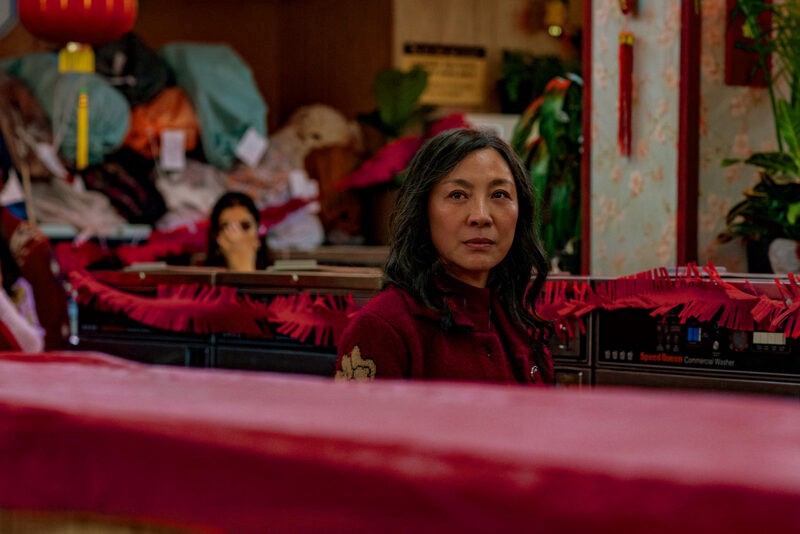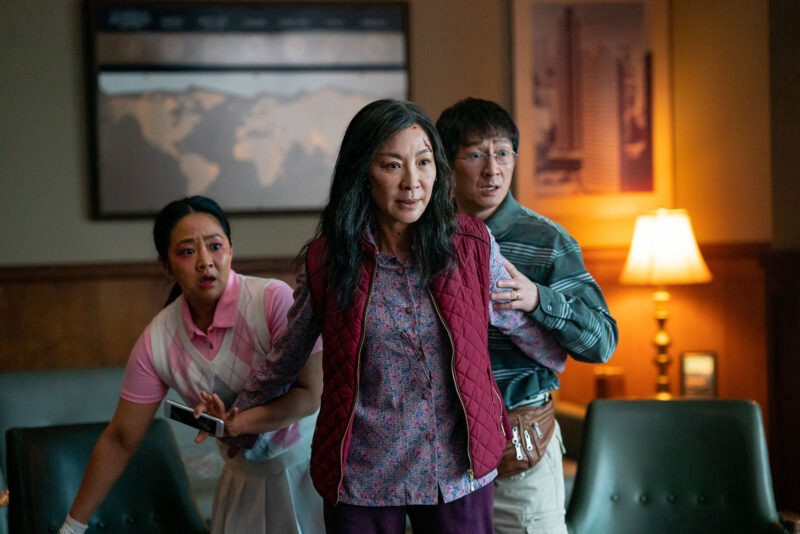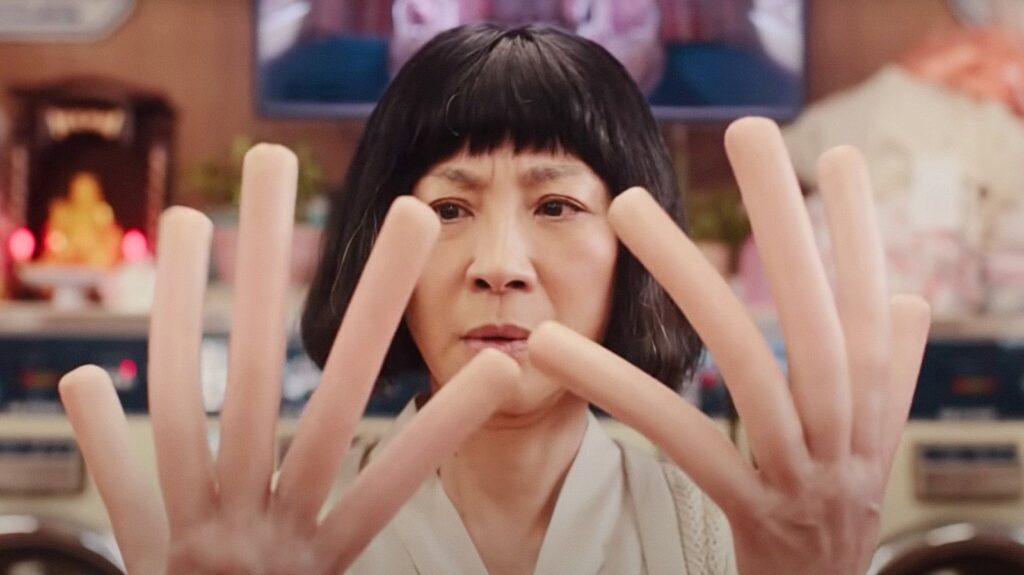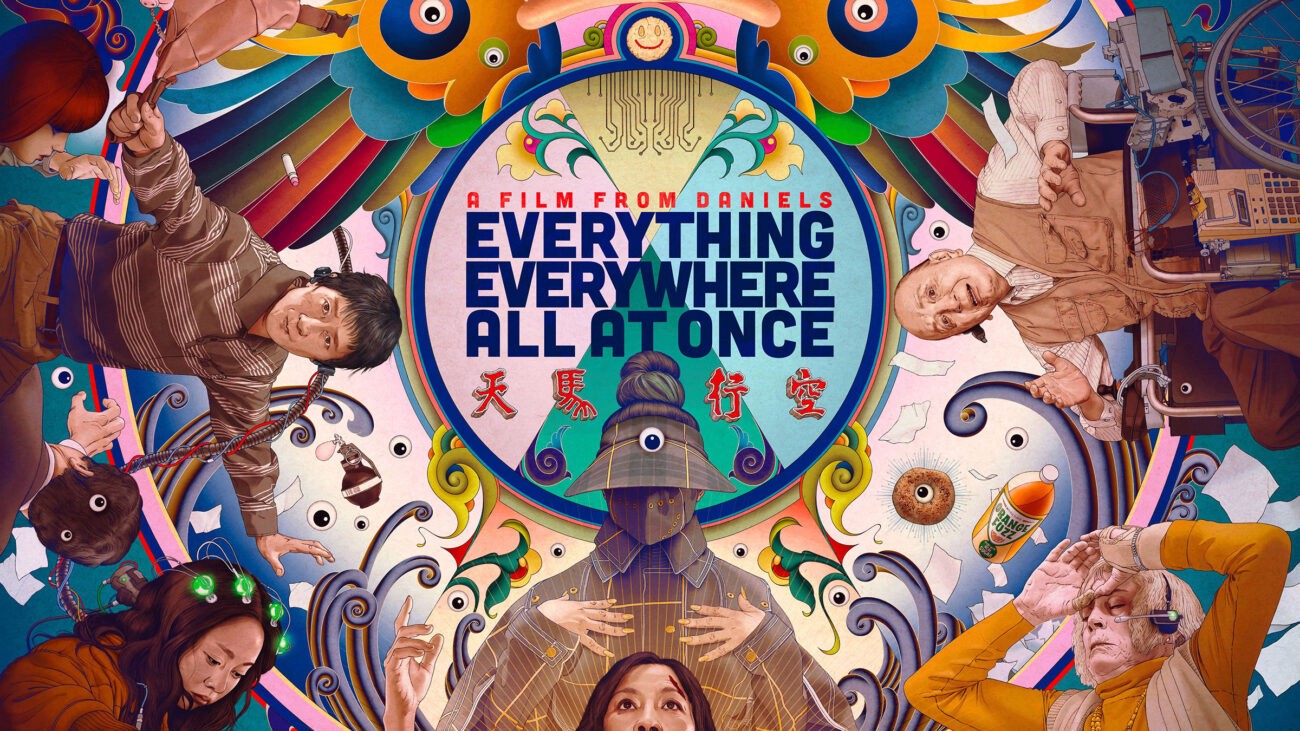By Ermioni Pavlidou,
The multiverse is trending as a movie concept and after Marvel’s Doctor Strange in the Multiverse of Madness (2022) A24’s new release, titled Everything Everywhere All At Once (2022) is also caught up in the bottomless nets of the multiverse. It was co-written and directed by Daniel Kwan and Daniel Scheinert — who are known as “the Daniels”. The film follows the tripartite chapter-driven course of Evelyn Wang (Michelle Yeoh) a Chinese woman immigrant to the US struggling to sustain her small laundry business, cope with her father’s Gong-Gong (James Hong) suffocating expectations, hold her marriage together and have a healthier relationship with her estranged daughter, Joy (Stephanie Hsu).
The arbitrary turn in Evelyn’s — until then painfully hectic — life is the trip to meet with an IRS auditor, Deirdre Beaubeirdre (Jamie Lee Curtis) in hopes that her business will not be seized. There she encounters one of her husbands, Waymond, (Ke Huy Quan) variants from the universe that created the mess she is about to be asked to fix; he informs her that an almighty reality warper, named Jobu Tupaki, passes through the multiple universes, that does actually exist, looking for Evelyn’s variants and she will not stop until she merges all universes into eternal nothingness. Jobu is a variant of Evelyn’s daughter, Joy, whom she apparently lets down in every universe.

So, what happens and how are the characters supposed to deal with the different versions of themselves in the multiverse? Chaotic energy with brilliant comedic timing ensues, and people are “connecting” to their bodies in a totally different dimension, there is a universe where Evelyn and Deirdre have sausages for fingers and are on the verge of a break-up. In the standard timeline of the narrative, Evelyn is thrown on a mission to save the time continuum from becoming a nihilistic bagel. The day begins with Evelyn being stressed out about her meeting that will most probably lead to her business’s doom; Waymond wants to serve her divorce papers which she does not know yet, and her father is visiting — or in her mind inspecting — her today and she gets in a fight with her daughter because she has not completely accepted that she is in a relationship with another woman, Beckie (Tallie Medel), and especially does not want to have to explain her daughter’s sexuality to her strict old-fashion judgemental father.

Once Evelyn is introduced to the vastness of the multiverse by the other version of Waymond from the “Alphaverse”, we meet through Michelle Yeoh’s amazing acting range of all the different “Evelyns”: a martial arts expert, an opera star, a hibachi chef and even a rock sitting next to another rock that is Joy gazing through a cliff; she deems herself in the initial universe the most unsuccessful, almost confirming what her father told her, disapproving of her choice to marry Waymond and move to the US. She starts to understand Jobu Tupaki’s motives, and how it is to feel that nothing matters when you feel everything all the time. She feels she has missed out on so many opportunities, and that makes her feel that, right now, she is the worst version of herself. And of course, there is the “Alphaverse Evelyn”, the one who created this mess trying to fulfill her dreams and right her missed opportunities through her daughter. And “our” Evelyn realizes that through the help of “her” Waymond, who reminds her how to be kind and why she fell in love with him so she decides to care and to fight for Jobu Tupaki to care with her.

Everyone’s performances are brilliant. Michelle Yeoh and Ke Huy Quan exquisitely illustrate the different hues of themselves in parallel universes and even mark the development their characters’ have attained by contrasting them in the same timeline’s past; appealing to existential questions and creating some more. Evelyn represents the self-doubt about choices that start to look as if they have no impact, the constant feeling that a moment might have had resulted in a completely different life and the escapism this leads to. Waymond is the optimist and is perceived as a delusional dreamer. He fights the dead-end the universe comes to by showing kindness, giving redemption to being a good person, and affirming the cliché of “seeing the glass half-full”. Lastly, Joy, or Jobu, is the villain with a cause. She was created by an emotionally distant mother who tried to shape her into perfection. Even though she has become an entity that ceased caring, and is ready to sink into eternal emptiness, she shows that she can care because she is reaching out to her mother and the reason she created this bagel that erases realities is to make Evelyn feel what she feels.
References
- Review: ‘Everything Everywhere All at Once’ does everything right, thedartmouth.com, Available here
- ‘Everything Everywhere All At Once’ Ending Explained: Complicated, Compelling, Bagels, collider.com, Available here
- Everything Everywhere All at Once review: An ingenious, nuanced multiverse that leaves Marvel in the dust, independent.co.uk, Available here




